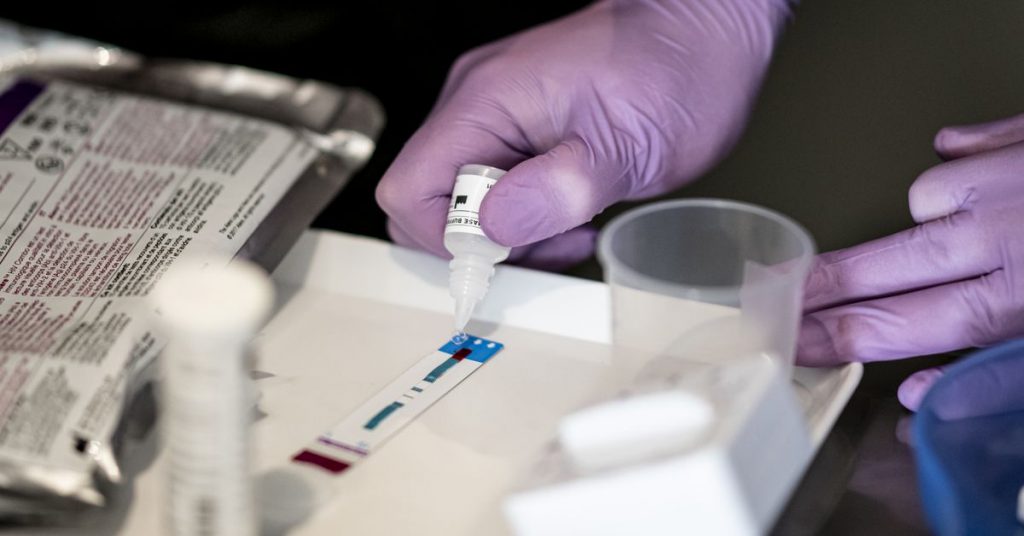Health departments are concerned about spikes in STIs while attention is on COVID-19
Across Idaho, the number of people getting tested for sexually transmitted infections and HIV has cratered. The Department of Health and Welfare is screening far fewer people than they did at this time last year, and many community organizations that do rapid HIV testing shut down when the state’s stay-at-home order went into effect on March 25th.
“Those things kind of just stopped,” says Kevin Brinegar, HIV prevention health program specialist at the Idaho Department of Health and Welfare. “That’s concerning.”
Rates of sexually transmitted infections in the United States have been steadily climbing over the past few years, with rates of syphilis, gonorrhea, and chlamydia reaching an all-time high in 2018. Now, with COVID-19 pulling the majority of public health resources, local health departments are worried that they’ll lose even more ground.
“When the dust settles on coronavirus, we’re going to find out about all the public health issues that we haven’t been able to pay attention to, and how big of a problem they’ve gotten as they’ve kind of been under the radar,” says Adriane Casalotti, chief of government and public affairs at the National Association of County and City Health Officials (NACCHO).
The NACCHO surveyed local health departments around the country to see how their HIV, STI, and viral hepatitis programs were affected by COVID-19 response efforts. Health departments reported that they’ve had to reduce or suspend some services, and that they’re concerned that those rollbacks will lead to outbreaks of diseases like syphilis, HIV, and chlamydia. Some jurisdictions have already seen increased clusters of cases.
Because of the pandemic, STI and HIV programs have limited the hours dedicated to testing and treatment clinics. “One of the most important things in the STI world is making sure that you can do open testing hours,” Casalotti says. “If you feel sick or not, you can come in, know your status, and get on your way. You can’t really do that anymore in this world of social distancing.” Clinics are also redirecting personal protective equipment to the front lines of the COVID-19 response.
In response, health departments are restructuring their priorities. Some reported that they were no longer able to start people on pre-exposure prophylaxis (PrEP) medication that can prevent HIV. “Individuals who have expressed interest in PrEP will be lost to care or [will] have been exposed to HIV by the time that we are able to provide PrEP services to them,” one department said in their survey response.
County health departments across Michigan have reduced some of their services, says Kristine Tuinier, manager of the division of HIV and STD programs at the Michigan Department of Health and Human Services. “I don’t think anyone is operating at full capacity,” she says. Most are focusing on working with people who have positive STI test results or symptoms of an infection, and they aren’t as able to screen people who feel fine.
Clinicians are doing a more robust assessment of each person who comes in for testing and treatment, she says, and checking to see if a physical exam is necessary or if they can be treated without as much contact. Clinics are also using oral medications, rather than shots (which require physical contact with clinicians) to treat STIs like gonorrhea.
Many people in public health departments who usually work on STIs and HIV have also been pulled to work on the COVID-19 response. Management of STDs in communities uses some of the same methods used in the COVID-19 response — namely contact tracing, the process of finding out who may have been exposed to a disease.
In Michigan, specialists are splitting their schedules, devoting half of their time to STI work and half their time to COVID-19 contact tracing. Most Idaho health departments don’t have investigators devoted specifically to STIs to begin with — their experts all work on multiple diseases — but they have less time to devote to that response now.
“When you add something like this to the mix, it really bumps things down the priority list,” Brinegar says. “They’re staying on top of their HIV and syphilis investigations, but the way that they’re doing it and the time investment is more tailored.”
Those priorities will stay lopsided until the COVID-19 pandemic is more controlled, and it’s unclear how long that might take. “It’s not just that these people are being pulled off of their daily work in the STI space. It’s that they’re pulled off it and we don’t when they’ll be able to return to that work,” Casalotti says.
It’s not clear what the long-term impact of the novel coronavirus cuts might be for people at risk for various STIs. “We know that when we don’t pay attention to things, they bubble up and remind us,” Casalotti says. “That’s what could happen at the end of the coronavirus response.”
Many sexually transmitted infections can be asymptomatic, so it might take time for communities to realize that they have an outbreak. If untreated, they can also cause serious complications — so any undetected spread could have long-term consequences.
“Say you have a decrease in even condom availability,” Brinegar says. “If people rely on these clinic spaces to pick up free condoms routinely, and then all of a sudden that’s shut off — what’s that going to translate into?”
The challenges, though, are pushing health departments to innovate in the ways they provide care. Idaho’s health departments are looking into at-home test kits for various STIs. Michigan is trying to be more nimble in their work. “It’s changed the way we look at everything,” Tuinier says. “I think, moving forward, we’ll have gained some important skills in how we do our work.”
In addition, the proposed expansion of the COVID-19 contact tracing workforce might also benefit STI and HIV programs in the future. The coronavirus pandemic has brought new attention to disease investigation experts.
“My hope is that when we can get back into kind of our normal day to day routine, there’s a community level awareness of who these folks are — that they’re not the sex police, they’re just trying to ensure public health,” Tuinier says. “I feel like that’s going to be one good outcome from all of this.”
You may be interested

Netflix now streaming Val Kilmer’s ‘most iconic’ role that made him a Hollywood star
admin - Apr 04, 2025[ad_1] Val Kilmer tragically died on Tuesday, at the age of 65, after a long battle with throat cancer, but…

Yellowstone's Kevin Costner lists his top 4 films including one he directed himself
admin - Apr 04, 2025[ad_1] Yellowstone and Hollywood legend Kevin Costner has revealed four of his favourite movies of all time. [ad_2] Source link

Top 10 Robert Downey Jr movies ranked: He changed No 1’s script in most personal way
admin - Apr 04, 2025[ad_1] The Top 10 Robert Downey Jr movies have been ranked on IMDB by film fans, and the star, who…
Leave a Comment
You must be logged in to post a comment.





















